Words with the root ob – Words with the root ‘ob’ invite us on an etymological adventure, tracing their origins to Latin and shaping the tapestry of our language. From obscure beginnings to their profound impact on modern discourse, these words hold a wealth of stories waiting to be uncovered.
Their journey through time has left an imprint on their meanings, revealing the evolution of language and the nuances of human expression. Let’s delve into the world of ‘ob’ and explore the fascinating linguistic landscape it has created.
Words with Latin Root ‘ob’
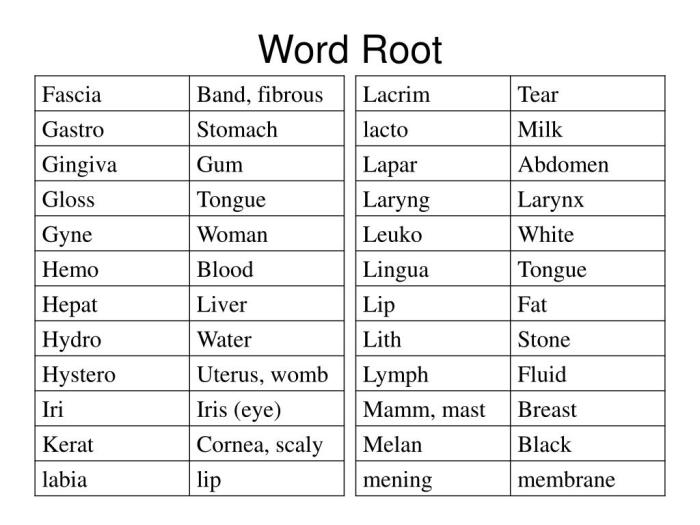
The Latin root ‘ob’ means ‘toward’ or ‘against’. It can take various forms, including ‘ob-‘, ‘op-‘, ‘oc-‘, and ‘of-‘. Words that contain the root ‘ob’ often relate to the concepts of opposition, obstruction, or facing something.
Words with ‘ob-‘
- Obdurate: stubbornly resistant
- Obese: excessively overweight
- Obliterate: destroy completely
- Obnoxious: highly unpleasant
- Obscure: not easily understood
Words with ‘op-‘
- Oppose: resist or disagree
- Oppress: subject to harsh or unjust treatment
- Opportune: favorable or convenient
- Opulent: very wealthy or luxurious
- Option: a choice or possibility
Words with ‘oc-‘
- Occasional: happening from time to time
- Ocular: relating to the eyes
- Occlude: block or obstruct
- Occult: hidden or secret
- Occupation: a job or profession
Words with ‘of-‘
- Offend: cause to feel upset or insulted
- Offer: present for acceptance
- Official: authorized or appointed
- Often: frequently
- Olfactory: relating to the sense of smell
Etymology and History of Words with Root ‘ob’
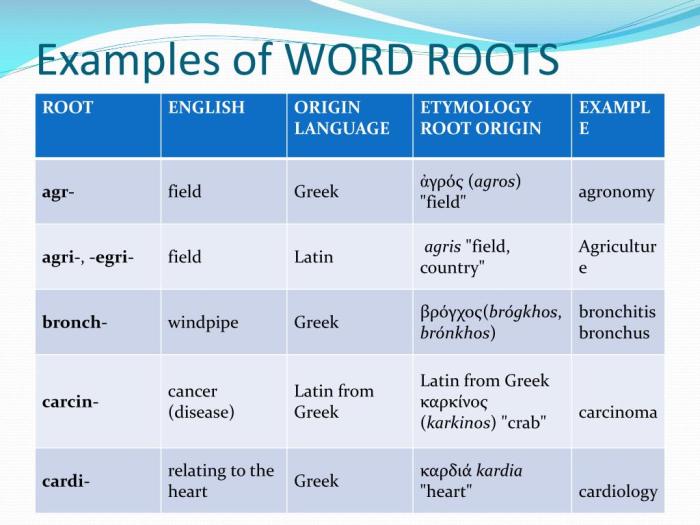
The Latin root ‘ob’ has a rich and diverse history, with its origins dating back to the Proto-Indo-European language. The root ‘ob’ originally meant “against” or “in the way,” and this meaning is still reflected in many words in English today, such as “obstacle” and “obstruct.”
Over time, the meaning of ‘ob’ has evolved and expanded, and it is now also used to indicate a state of being or a condition, as in “obese” or “obnoxious.”
Proto-Indo-European Origins
The root ‘ob’ is thought to have originated in the Proto-Indo-European language, which was spoken by the ancestors of most European languages. In Proto-Indo-European, ‘ob’ meant “against” or “in the way,” and this meaning is still reflected in many words in English today, such as “obstacle” and “obstruct.”
For example, the word “obstacle” comes from the Latin word “obstare,” which means “to stand in the way.” Similarly, the word “obstruct” comes from the Latin word “obstruere,” which means “to block up.”
Semantic Relationships and Usage: Words With The Root Ob
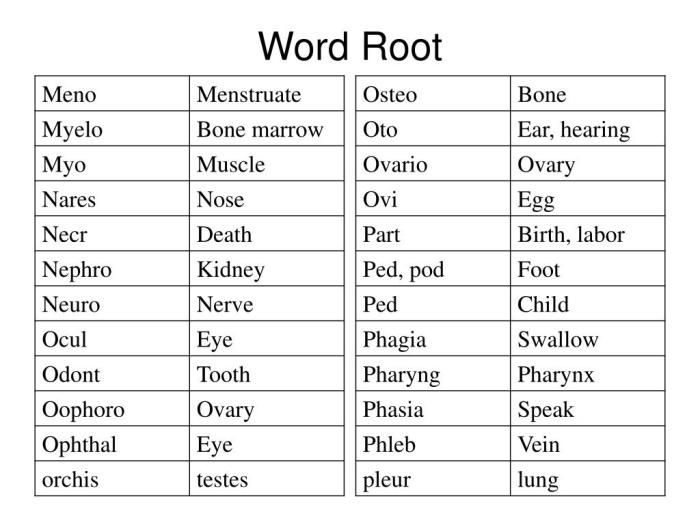
Words with the root ‘ob’ share a common semantic core of ‘against’, ‘obstruction’, or ‘in the way’. They often denote actions or conditions that oppose, hinder, or block something.
These words are used in various contexts and for different purposes. They can express:
- Opposition or resistance
- Hindrance or obstruction
- Negation or reversal
For example, “obstruct” means to block or hinder, while “object” means to express opposition or disapproval.
Opposition and Resistance
Words with the root ‘ob’ that express opposition or resistance include:
- Objection
- Obstruct
- Obstinate
These words convey a sense of opposition, defiance, or refusal to comply.
Morphological Analysis of Words with Root ‘ob’
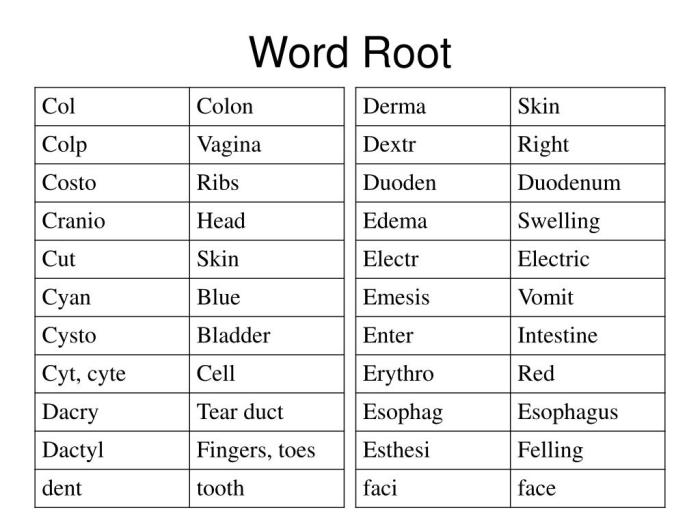
The root ‘ob’ is often combined with prefixes, suffixes, and other affixes to form various words with distinct meanings.
Prefixes
- Ob-: This prefix typically denotes opposition, resistance, or prevention. (e.g., obstruct, object)
- Oc-: A variant of ‘ob-‘ used before ‘c’ (e.g., occlude)
- Op-: A variant of ‘ob-‘ used before ‘p’ (e.g., oppose)
Suffixes
- -ate: Forms verbs indicating a process or action (e.g., obliterate, obstruct)
- -ion: Forms nouns denoting an action, process, or state (e.g., obstruction, oblivion)
- -ive: Forms adjectives indicating a quality or tendency (e.g., obtrusive, obsessive)
Other Affixes, Words with the root ob
- Circum-: This prefix means ‘around’ or ‘surrounding’ (e.g., circumvent)
- Inter-: This prefix means ‘between’ or ‘among’ (e.g., intervene)
- Sub-: This prefix means ‘under’ or ‘below’ (e.g., subordinate)
Examples of Words with Root ‘ob’ in Context
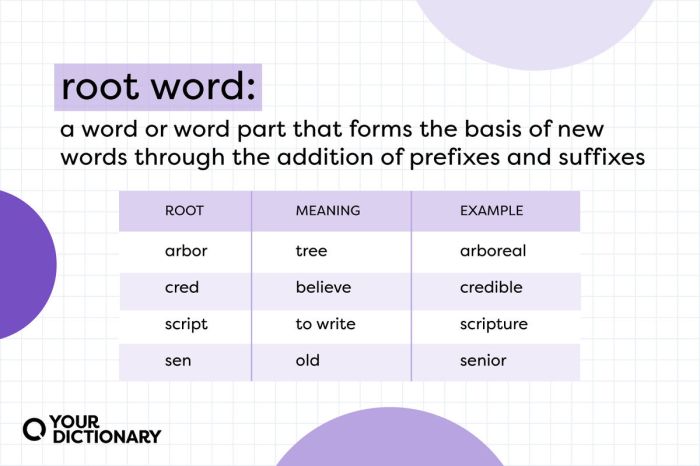
Words with the root ‘ob’ appear in various contexts, contributing to the overall meaning of sentences in different ways. Here are some examples:
Obstruct
- The road was obstructed by a fallen tree, causing a traffic jam.
In this sentence, ‘obstruct’ means to block or hinder something’s passage, which caused the traffic jam.
Obtain
- The student obtained a high score on the test through hard work and dedication.
Here, ‘obtain’ means to acquire or get something, in this case, a high score on the test.
Objection
- The lawyer raised an objection to the evidence presented by the prosecution.
‘Objection’ refers to an expression of opposition or disagreement, which the lawyer expressed against the evidence.
Delving into the etymological roots of words with the root “ob,” we uncover a fascinating connection to the enigmatic concept of the pH scale. As described in the ph scale is milady , this measure of acidity and alkalinity sheds light on the diverse properties of substances, mirroring the multifaceted nature of words with the root “ob.”
These words, often embodying ideas of opposition or obstruction, reflect the duality that pervades our linguistic landscape.
Observe
- The scientist observed the behavior of the animals in their natural habitat.
In this example, ‘observe’ means to watch or notice something carefully, which the scientist did with the animals.
Cultural and Literary Significance

Words with the root ‘ob’ have played a significant role in shaping cultural and literary expressions throughout history. These words often carry connotations of resistance, opposition, or adversity, reflecting the human experience of facing obstacles and challenges.
In literature, words with the root ‘ob’ have been used to create characters who embody resilience and determination in the face of adversity. For instance, in Shakespeare’s “Othello,” the titular character faces numerous obstacles and prejudices due to his race and social status.
His struggles highlight the themes of racism, jealousy, and the human capacity for evil.
Art and Cultural Expressions
In art, words with the root ‘ob’ have been used to convey themes of struggle, perseverance, and triumph. For example, the painting “The Persistence of Memory” by Salvador Dalí depicts melting clocks, symbolizing the relentless passage of time and the futility of resisting its power.
The title of the painting uses the word “persistence,” which has the root ‘ob,’ to emphasize the idea of overcoming obstacles and enduring despite adversity.
FAQ Resource
What is the significance of the Latin root ‘ob’?
The Latin root ‘ob’ carries the primary meaning of ‘against’ or ‘in the way,’ providing a foundation for a diverse range of words.
How has the meaning of words with the root ‘ob’ evolved over time?
The meanings of words with the root ‘ob’ have undergone subtle shifts over time, often reflecting changing societal norms and perspectives.